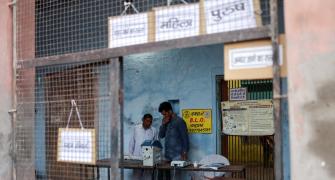In what could be seen as a possible obstacle to the growing ties between India and China, a recently de-classified paper of the Central Intelligence Agency has said that late prime minister Jawaharlal Nehru was consistently taken for a ride by the Chinese in the months and years prior to the 1962 war.
The top secret documents of March 1963 were approved for release only in May 2007.
The declassification of documents pertaining to several aspects of domestic and international politics has been seen by the current CIA brass as a part of a new transparency as also providing a glimpse into the thinking and workings of the nodal intelligence outfit.
One set of documents called the Cesar-Polo-Esau Papers deal with Communist countries notably China and the erstwhile Soviet Union and three sections of which are devoted to an analysis of the Sino-Indian relations leading up to the 1962 debacle.
One of the major points of contention of the CIA is that the Chinese premier Zhou en Lai (at the time going by the spelling of Chou en Lai) consistently impressed upon Nehru that Peking (Beijing) had no territorial ambitions and that the maps that the Chinese were suing to portray vast tracts of Indian territory as theirs were 'old' maps from the Kuomintang era that had no time to be revised.
'The Sino-Indian dispute, as we see it, did not arise as a function of the Sino-Soviet dispute,' the CIA said in its analysis in 1963.
According to the CIA analysis the developments between 1950 and late 1959 were marked by Chinese military superiority which, combined with cunning diplomatic deceit, contributed for nine years to New Delhi's reluctance to change its policy from friendship to open hostility toward the Peking regime.
'It emerges that above all others Nehru himself -- with his view that the Chinese Communist leaders were amenable to gentlemanly persuasion -- refused to change this policy until long after Peking's basic hostility re-think his China policy, Nehru continued to see a border war futile and reckless course for India,' the CIA analysis said.
'His (Nehru) answer to Peking was to call for a strengthening of the Indian economy to provide a national power base of effectively resisting an eventual Chinese military attack.
In the context of the immediate situation on the border, where Chinese troops had oocupied the Aksai Plain in Ladakh, this was not an answer at all but rather an implicit affirmation that India did not have the military capability to dislodge the Chinese,' the CIA maintained.
'Chou En-lai, in talks with Nehru in 1954 and 1956, treated the Chinese old maps as representing Peking's claim but, on the contrary, as old maps handed down from the previous mainland regime which had 'not yet' been corrected,' the analysis has said.
'This provided the Chinese premier with a means for concealing Peking's long-range intention of surfacing Chinese claims at some time in the future (when there would be no longer any necessity to be deceptive about them) while avoiding a dispute with the Indian Prime Minister at the present,' the CIA reasoned.
'As Peking and New Delhi were generally cordial to each other in these early years, the Chinese had not wanted to change their policy toward Nehru and thereby lose the benefit of an important champion of Peiping's cause in international affairs,' the CIA said.
'They had not wanted to alert the Indian leaders to their move on the road until such time as the Indians could do nothing about it. They apparently believed that like China's other borders, the Sino-Indian border need not be delimited and that the matter could remain in limbo,' the agency surmised.
The Central Intelligence Agency also believed that there was a domestic political angle for the fashion in which China acted with Nehru -- a perception that somehow the then Indian prime minister was more positively reconciliatory to the Chinese regime than the opposition in India.
'His (Nehru) prestige is so great in India that the masses in crisis situations merely follow his lead,' the CIA said as being in the minds of Chinese leaders at then time.
'A great political leader with Nehru's enormous prestige could prevent vigorous anti-China outbursts if he so desired. And he if he cannot prevent sharp outbursts he could certainly control them when once they took place,' the agency has said on Beijing's thinking at the time.
The agency argued that China's leaders finally realized that independence of the Congress Party and the prime minister from the political Opposition in Parliament and that Beijing 'could not believe that the Opposition was capable of creating a perceptible shift in Nehru's policy and actions.''Chou's strategy was to avoid making explicit in conversations and communications with Nehru, any Chinese border claims, while avoiding any retraction of those claims which would require changing Chinese maps,' the CIA says making also the point that one of the major objectives of Chou was to impress upon the fact that New China had simply no time to attend to the border issue with India on account of other security issues like the Korean peninsula.
The CIA also makes the point that Nehru was perhaps overly trustful of Chou to the point of being even naive for the Indian leader rejected advice from a former Prime Minister of Burma, Ba Swe who urged Nehru to be "cautious" in dealing with Chou.
Nehru wrote back to the Burmese leader saying that Chou is indeed an 'honorable man' who could be trusted. But the CIA goes on to say, 'The Indians later complained, in pathetic terms of the Chinese practice of deceit.'
Down the line the CIA makes the point that Nehru backed himself into a corner and in a large measure by the strong protests in Parliament and in the streets and this aspect of Indian democracy is something that the leadership in Beijing never fully grasped.
The CIA analysis of 1963 makes the point that in the final analysis China abandoned the idea of making a deal with India for the reason that the only acceptable carrot to Nehru was the whole of Aksai Chin and was not going to settle for tracts of land here and there.







